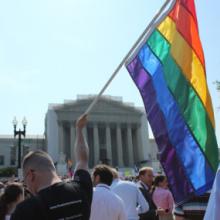Kansas

Image via bakdc/Shutterstock.com
On June 9, the U.S. Department of Justice indicted Adam Purinton, a white man from Kansas, with hate charges for allegedly shooting three men. Two of the men were Indian nationals, and one died of his wounds. According to the Kansas City Star, Srinivas Kuchibhotla, the Indian national who was fatally shot, worked at the company Garmin’s Olathe, Kansas location as an engineer, alongside fellow engineer Alok Madasani, the second Indian national who was shot.
In Indian American communities, we usually believe that being a certain kind of immigrant can save us. If we dress properly, no one can call us foreign. If we’re documented, no one can question our legal status. If we are highly educated, no one can accuse us of being lazy immigrants. If we (especially women) don’t go to bars, no one can accuse us of bad behavior.
We’ve convinced ourselves that if we melt into what we call American culture — into white culture — we can get by without getting killed.
The two men targeted by a racist and violent white terrorist were the quintessential “good immigrants.” But their stories of success — working at Garmin, receiving Masters degrees from the U.S. — did not protect them from hate. Economic status or education do not matter in the face of an extremist who equates skin color with terrorism.
In January 2016, the Rev. Cynthia Meyer told her United Methodist Church congregation she felt “called by God to be open and honest” about who she is: “a woman who loves, and shares her life with, another woman.”

The Rev. Cynthia Meyer. Image via Sally Morrow/RNS
The Rev. Cynthia Meyer said she was “called by God to be open and honest” about who she is. So, during her first sermon of 2016, Meyer broke the news: She loves another woman.
“I’ve been praying, and in a process of discernment for some time, particularly over the past few years, once I entered into a relationship,” said Meyer, pastor of Edgerton United Methodist Church.

Image via Kokliang/Shutterstock.com
Mass shootings are always and everywhere perverse and twisted events. But the Kansas shooting Feb. 25 that left three victims plus the gunman dead and 16 others injured possessed a few additional layers of perversity.
For one, when I tuned into the GOP presidential debate shortly after hearing news of the shooting, I expected CNN’s debate team to make mention of this newest spasm of random and brutal violence, and maybe even ask the candidates to address the issue. That was, unfortunately, not the case.

Frazier Glenn Cross. Image via Johnson County Sheriff's Office / RNS
A judge on Nov. 10 issued the death penalty for the white supremacist convicted of shooting to death three people at two Jewish centers in Kansas last year.
Johnson County District Court Judge Thomas Kelly Ryan sentenced Frazier Glenn Cross, 74, to die by lethal injection.
A jury in early September convicted Cross, a former senior member of the Ku Klux Klan, of the murders and recommended that he be put to death. Cross also was convicted of three counts of attempted murder for shooting at three other people.
I have great respect for religion writer Jonathan Merritt, even though we disagree on a lot of social and theological issues. He evoked a maelstrom about his article suggesting the Arizona law allowing businesses to deny service to LGBTQ people was less than Christian, and yet he stands behind his words.
Basically, many prominent voices from the Baptist and Neo-Calvinist camps went berserk about his call for tolerance; never mind that he didn’t even take on the moral issues surrounding LGBTQ identity itself. It was simply enough that he called for equal treatment of all people as fellow human beings, period. But he broke rank with the conservative Christian rank-and-file, which depends heavily on uniformity of voice and position on key issues.
Merritt took a risk, knowing full well that he’d likely suffer for it. And he did. In a small online forum of fellow religion writers, he expressed dismay both at the aggressive, hateful nature of peoples’ response from the right, as well as the relative palpable silence from the center and left.
For that, to the degree that I can speak for myself and others like me, I’m sorry, Jonathan. When someone steps out like this, putting himself at risk, we should rally to support him, as much as those on the right rally behind causes.
Gay rights are colliding with religious rights in states like Arizona and Kansas as the national debate over gay marriage morphs into a fight over the dividing line between religious liberty and anti-gay discrimination.
More broadly, the fight mirrors the national debate on whether the religious rights of business owners also extend to their for-profit companies. Next month, the U.S. Supreme Court will decide whether companies like Hobby Lobby must provide contraceptive services that their owners consider immoral.
The Arizona bill, which is headed to Gov. Jan Brewer’s desk for her signature, would allow people who object to same-sex marriage to use their religious beliefs as a defense in a discrimination lawsuit.
If you wonder what a right-wing political agenda laden with phony morality would look like, here are two signs.
First, from the increasingly shrill patriarch of Silicon Valley, venture capitalist Tom Perkins, the argument that rich people like him should get more votes in elections than poorer people.
Second, from the ever vigilant Kansas Legislature, a bill that would legalize segregation of gays in the name of protecting the religious freedom of those who loathe gays.
Perkins, of course, rode the gravy train to great wealth by backing those who actually did the work, took the risks, and built something.
North Carolina lawmakers on Wednesday approved a bill to prohibit judges from considering “foreign laws” in their decisions, but nearly everyone agrees that “foreign laws” really means Shariah, or Islamic law.
North Carolina now joins six other states — Oklahoma, Arizona, Kansas, Louisiana, South Dakota, and Tennessee — to pass a “foreign laws” bill. A similar bill passed in Missouri, but Gov. Jay Nixon vetoed it, citing threats to international adoptions.
The bills all cite “foreign laws” because two federal courts have ruled that singling out Shariah — as Oklahoma voters originally did in 2010 — is unconstitutional.
The estranged son of a Kansas pastor famous for protesting the funerals of soldiers and AIDS victims has condemned his family’s plans to picket the funerals of the 26 people — including 20 children — who were killed when a gunman stormed a Connecticut elementary school.
In the wake of Friday’s massacre in Newtown, Conn., members of Westboro Baptist Church in Topeka, Kan., posted Twitter messages saying they would picket outside Sandy Hook Elementary School in Newtown. The messages provided no information on the time of the planned picketing.
"Westboro 'God hates Fags' Baptist Church is planning to picket at Sandy Hook, to praise 'God's judgment,'” was posted by Margie Phelps, the daughter of Westboro leader Fred Phelps Sr. Her sister, Shirley Phelps-Roper, tweeted Saturday that the group would "sing praise to God for the glory of his work in executing his judgment."
Recently, the Kansas’ legislature and governor enacted a law to ensure state courts and agencies do not consider foreign laws in legal decision-making. While the language is broadly written, the law’s narrow intention is clearly understood. The Kansas legislature has irrationally concluded that Sharia law somehow threatens the state’s well-being and decisive action was needed.
This, of course, is false.
Muslim civil rights groups are calling a new Kansas law that bans Shariah in state courtrooms an expression of Islamophobia that is vulnerable to a legal challenge.
The law, signed by Republican Gov. Sam Brownback on Monday (May 28), does not specifically mention Shariah, or Islamic law, but forbids state courts from basing decisions on foreign laws that contradict rights granted by the U.S. Constitution and state constitutions.
But the Council on American-Islamic Relations and other Muslim groups called the law little more than anti-Muslim propaganda.







